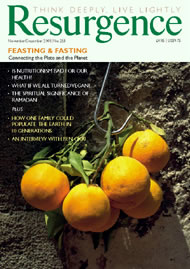THE LATE, GREAT Anita Roddick used to say that you could never train people to be entrepreneurs in business school – though you could train people not to be, because the very essence of entrepreneurship is the ability to see the world differently.
A similar thought provides the basis for this book, by the man who brought us The Green Consumer Guide, John Elkington, and Pamela Hartigan, the managing director of the Schwab Foundation for Social Entrepreneurship. The “Unreasonable People” of the title are not just imagining the world differently: they are refusing to accept the way it is.
“Being unreasonable is not just a state of mind,” say the authors at the outset. “It is also a process by which the older, outdated forms of reasoning are jettisoned and new ones conceived and evolved.”
The stories of the social entrepreneurs at the heart of this fascinating and life-enhancing book are, in other words, gritty stories of determination and an unreasonable refusal to accept the world as it is.
That is a familiar story in itself. What takes the breath away is the sheer scale of what some of them have achieved. Like Javier González of the Latin American non-profit abcdespañol, which cascades literacy skills via people embedded in impoverished communities, who learn the skills and build a network of trainers. In Guatemala alone, partly thanks to them, illiteracy fell from 60% to 30% in just four years.
Or like dairy farmer Héctor González in Mexico who now runs the largest self-funded food bank in the country, feeding 100,000 people a day.
Or the organisation First Book, founded by a former volunteer reading tutor called Kyle Zimmer, which has distributed over 48 million books across the USA in its first fifteen years.
My favourite is the Japanese farmer Takao Furano, who went organic after reading Rachel Carson’s Silent Spring and then stumbled on the idea of protecting his rice fields with Aigamo ducks, which ate the insects and grubs and dug up the weeds, aerating the water as they did so. His ‘duck rice’ now sells at a considerable premium, which makes it a beneficial crop for small farmers, and his methods are now used on 75,000 farms across Eastern Asia.
These are particularly important examples for us in Britain, where there is so much innovation but so little vision, and where – thanks to a sclerotic political and banking system – so little is ever taken to scale. The sheer ambition of the individuals chronicled by Elkington and Hartigan has, for that reason, a slightly different message for us than for nations where social entrepreneurship has come of age.
The social entrepreneurs described here are all people who have, not just a world-changing idea, but a clear sense of what might drive it – whether that is a profit-making driver or a moral one, where small groups of committed people transmit ideas to tens of thousands. That is what makes them unreasonable, of course. They are not supplicants to grant-funders or government. They get on and create those drivers themselves.
So there is at the heart of the book this implacable sense that anything is possible – which we need these days. Where I find myself in two minds about it is whether Elkington and Hartigan are being quite unreasonable enough themselves.
This showcase of social entrepreneurship is enough to get a glimpse of how the world might be changed, but the authors do – as they have to – accept the world as it is in other ways. That is both what is inspiring about the entrepreneurs – they make it happen with the tools before them – and what makes you wonder whether the economic system itself might change in more fundamental ways.
When the authors talk about Wal-Mart chief executive Lee Scott having a ‘conversion experience’ about making a difference, they are too lenient on him. Goodness knows what Wal-Mart would be like if he had experienced anything less.
But this is a quibble about an important book which tells a series of fascinating stories, and which – by implication – certainly made me reflect on the cramped dullness and meanness of contemporary government and politics. It also carries within it probably the most hopeful message I have heard about the state of the world – that the bigger the problem, the bigger the opportunity.
That is rhetorically true, but it is also true in a more practical way. When thousands are excluded from the mainstream, that is an injustice. When millions are excluded, that is also a potential business opportunity which somebody seriously unreasonable might use to construct a way out.






